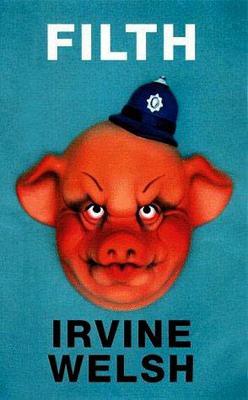The tapeworm in Bruce’s stomach seems to know more about Bruce than he knows about himself. Bruce goes to great lengths to avoid any time for self-thought or evaluation. He occupies his time with work, sex, and drugs as much as he can. On the weekend, he goes to work for overtime, and on his time off, he’s either at the bar getting “three sheets to the wind”, or on the lookout for prostitutes. Bruce can’t even stand a quiet car ride, and so tunes out to Ozzy Osbourne or Iggy Pop and The Stooges. The worm in Bruce’s stomach wisely says, “You need to be at work. You need the job; hating, yet at the same time thriving on, its petty concerns. These concerns are enough to distract you from the Self you must only face up to at night between the extinguishing of the television set and the onset of a jittery and fitful descent into a physically bruising sleep.” (260). It’s too bad Bruce can’t hear the worm in his stomach because it would do him a lot of good. The worm boils the way Bruce lives his life down into one sentence. “The Host’s philosophy of life seems then, more rather than better.” This philosophy embodies the motto of a pig. Quantity over quality.
Why is it that Bruce goes through so much trouble to avoid, as the worm calls it, “the Self”? One possibility is that Bruce is insecure, that he doesn’t like the person he’s become. Bruce comes from a mining family in some small village of Scotland, a fact that, at out point, he denies out of shame. The worm explains that Bruce realized at an early age that the working class, his family, had no power, and that the governing class made the rules. It is most likely for this reason that Bruce decided to become a police officer.
One of the only moments in the book where Bruce is vulnerable is when he tries to save a man on the street that just had a heart attack. This is the one time that we, the reader, realize Bruce actually has the ability to care about another human being. When he fails at saving the man’s life, a feeling of sadness quickly turns to anger as onlookers guake at the tragic scene. Bruce describes the onlookers, “That’s what the ghouls want… they want to drink the misery out of your faces.” Wanting to know about the experience of seeing a man die in his arms, a reporter asks Bruce, “How did that make you feel?” Bruce responds, “Eh? I ask the cunt. –What the fuck…”(114) Unable to face his own feelings, he immediately heads to a bar, and then home with a prostitute, blurring out his pain with distractions. This question stays at the back of his head though, occasionally coming back into his thoughts from time to time, haunting him and forcing him to reflect on his feelings.
Bruce’s character is a deeply disturbed one. He relishes in the pain of others, and on many occasions, purposefully inflicts pain for no reason other than for his own enjoyment. When he first steals an old ladies paperweight, he does so thinking it is valuable. Upon finding the paperweight missing, the old lady tells Bruce that it only has sentimental value, and only wants it back because her deceased husband gave it to her long ago. Although he could have easily anonymously left it in her house, Bruce decides to chuck it into the river instead. Another time, Bruce is in a great mood and gets a taxi ride home. “I’m almost tempted to give him a tip,” Bruce says, “but think better of it, drinking in the stoical disappointment on his face as I count out the exact fare.” (226). Just a note that neither of these things are even close to some of the evil things Bruce does. But why is it that Bruce decides to be cruel for no reason. This situation is so similar to the earlier situation when Bruce tried to save the dying man’s life, except this time the roles are reversed. It is Bruce taking in the pain on someone’s face, and not the onlookers drinking in Bruce’s. Why is it that Bruce tries to inflict pain on others, even though he knows what its like to be one the other side?
The worm in Bruce’s stomach may provide some insight into why Bruce does these things. “The important thing was to be on the winning side…” the worm says on Bruce, “only the winners or those sponsored by them write the history of the times… The worst ever thing to be is on the losing side. You must accept the language of power as your currency, but you must also pay a price. Your desperate sneering and mocking only illustrates how high the price has been and how fully it has been paid. The price is your soul. You came not to feel. Your life, your circumstances and your job demanded that price.” Bruce knows what it’s like to be on the other side, the losing side, the mining working class side, but chose to be on the winning side. He chose the side of power, the winning side, the side that inflicts the pain, and doesn’t receive it.
At one point, Bruce is asked why he enjoys other peoples pain, and he replies by saying that because bad things happen to other people, it means they aren’t happening to him. Every time he inflicts pain on someone else, it reminds him that he’s the one on the winning side. To have power over someone is to have the ability to inflict pain on them. Bruce knows this and uses his rank as a police officer to do so. The damn pig.



No comments:
Post a Comment